2014 - Turning Our Dream into a Reality
The Story of Ottawa’s MarketMobile
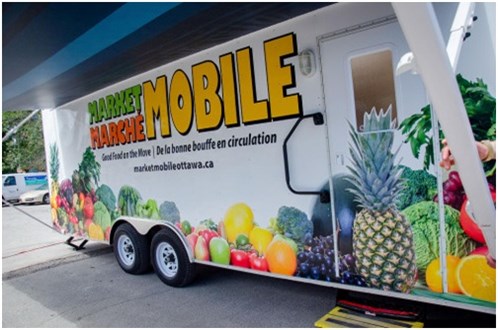
Three years ago, Ottawa’s Poverty and Hunger Working Group had a dream of creating a mobile market that would bring healthy, affordable, and culturally appropriate food to Ottawa neighbourhoods. It seemed like a pie in the sky idea at the time. In fact, most people thought we were crazy.
But this dream became a reality last summer, when, with the support of Ottawa Public Health, the Working Group secured a 40 foot OC Transpo bus to launch a 21-week pilot. Using planks of plywood as shelves, handwritten laminated price signs, a variety of baskets and crates, and literally hundreds of pounds of high-quality, affordable veggies and fruit, we hit the ground “rolling” on July 26th.
The grocery-store on wheels became known as the MarketMobile. It operated every Saturday, visiting four communities (two each day), from the months of July- December, 2014. To everyone’s astonishment, the MarketMobile pilot sold an extraordinary amount of products including: 1418 lbs of bananas, 722 lbs of carrots, and 1371 individual mangoes! The total of $21,685 in fresh products (retail value: $30,359) was brought into communities that otherwise would not have had easy access to healthy and affordable food.
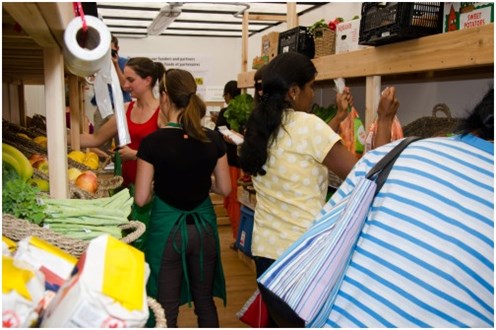
But we learned something else during the pilot… the MarketMobile ended up being about so much more than simply food – it served as a catalyst for community change and engagement. Over 1,000 volunteer hours were contributed by residents from across the City over the course of the pilot and communities, on their own accord, began organizing events such as barbeques and community kitchens to coincide with MarketMobile visits. The MarketMobile, as it turned out, became a way of connecting Ottawa residents to community resources and to one another.
Fast forward to today, and with support from the Community Foundation of Ottawa’s New Leaf Grant and the Ministry of Health and Long Term Care, the MarketMobile operates two days per week, has been expanded to four additional locations, hired a full-time coordinator and begun year-round operation with a truck and retrofitted trailer.
Products on the MarketMobile is selected based on residents’ needs and cultural preferences, purchased in bulk and sold on a cost recovery basis. The MarketMobile carries a selection of over 30 different items each week based on the requests of individuals in the communities. Through a partnership with Loblaws and Cibo Food, local Ottawa wholesalers, the MarketMobile has been able to utilize wholesale buying power to procure the most affordable prices on products. The prices on the MarketMobile are, on average, 40% less than in retail grocery stores.
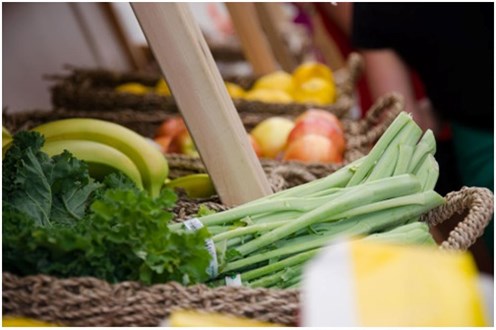
The project is hosted at Rideau Rockcliffe Community Resource Centre and continues to be led by the Poverty and Hunger Working Group, The Coalition of Community Health and Resource Centres of Ottawa, in collaboration with multiple public, private and community partners including: Ottawa Public Health, Ottawa Community Housing, Loblaws, Cibo Food, Coalition of Community Health and Resource Centres of Ottawa, Ottawa Poverty Reduction Network, Community Development Framework and countless engaged and passionate community members.
Over 100 people typically come out to each MarketMobile stop – providing a great opportunity to expand customers’ food skills and knowledge. Here we have Luke, an Ottawa Public Health Community Food Advisor, who was providing samples of a kale recipe made with ingredients purchased on the MarketMobile.
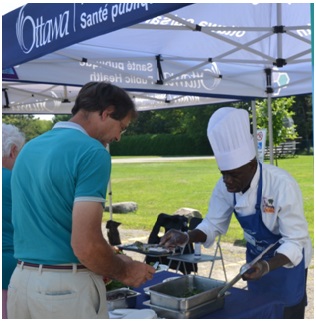
The MarketMobile has generated extensive media coverage during its time on the road and garnered interest from organizations and governments across Canada. Remarkably, the MarketMobile has raised the awareness of food insecurity and also generated positive press for the communities it serves. We are especially excited to be supporting the city of Halifax and Nova Scotia Public Health as they work towards establishing a similar mobile market in their city!
Looking ahead to the future, we are committed to incorporating revenue generating practices into the model. Our hope is that the MarketMobile can become less reliant on external funding while also, down the road, expanding to more communities– ensuring that all Ottawa residents have equitable access to healthy, affordable, and culturally appropriate food.
Are you planning on visiting Ottawa anytime soon? Everyone, regardless of income or places of residence, is invited to shop and visit the MarketMobile. For more information on the MarketMobile or to check out if we’ll be rolling into a community near you, visit: www.marketmobileottawa.ca
2012- What we’ve done
Our First project was the Good Food Market’s Project. Good Food Markets are community markets that sell a variety of healthy foods at cost. These markets bring healthy produce to neighbourhoods where it might not otherwise be available and where farmers’ markets are not viable because sales are too low to cover farmers’ costs.
The Poverty and Hunger Working Group organized four pilot markets this summer including social housing neighbourhoods served by the Sandy Hill Community Health Centre, Somerset West CHC, Pinecrest Queensway Community Health Centre and Nanny Goat Hill Community Garden. Each site committed to two pilot markets for the summer. In addition to food stalls, we organized a variety of community activities such as music, children’s activities, games, prizes and food education.
The Good Food Market has also partnered with the Social Planning Council’s Collaborative Food Buying pantry. The Collaborative Food Buying Pantry is a model of co-operative support in which low income people established food buying collectives or clubs. The Collaborative Food Buying Pantry has participated at each Good Food Market by selling items from their bulk purchasing reserves. As a result of this partnership, the Good Food Markets have been able to supply the communities with the option to purchase low cost dried foods such as beans, rice, nuts, flour and legumes. Not only are the Good Food Markets providing low income communities with the option of purchasing fresh foods but through this valued partnership, the markets are also able to offer communities the opportunity to purchase much needed proteins and cultural foods.
Good Food Market at Sandy Hill
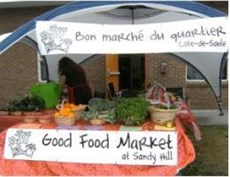
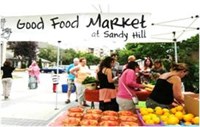
To ensure that our markets we meeting the needs of the community we completed a comprehensive evaluation of our Good Food Markets Project. Community surveys were taken at each market. Without exception, the feedback has been very positive. The community felt that as a result of the markets, they:
- Had more access to healthy affordable and culturally appropriate food because the markets were close to their home
- Saved money on food
- Would eat more fruits and vegetables, and feel healthier
Eighty six percent of the community surveyed were very satisfied with the Good Food Markets and said they would like to see Good Food Markets in their communities as least once a week.
The community has provided exceptionally positive feedback for the Good Food Market pilot and their input demonstrates the desire for continued Good Food Markets in their community.
Surveys conducted at Rochester Heights and Nanny Goat Hill Good Food Markets
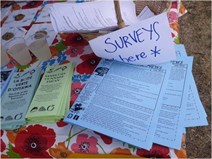
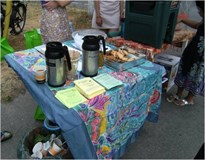
Next Steps - Advocacy
The Poverty and Hunger working Group recognizes that we have a responsibility to engage and support advocacy initiatives that call for policy and systems changes for an increased focus on access to healthy affordable food for people living in poverty.
Survey results showing impacts of the Good Food Markets
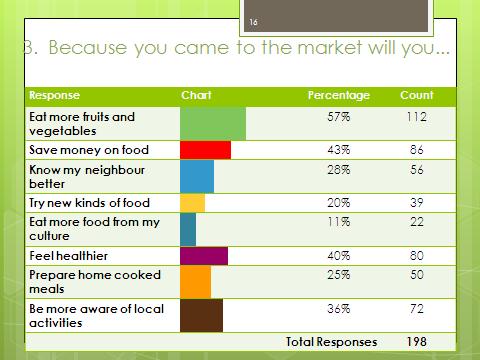
The Ottawa Food Policy Council
The Poverty and Hunger Working Group will support the advocacy and policy initiatives undertaken through the new Ottawa Food Policy Council through members’ participation on the Council.
Community Development Framework (CDF) Food Security Working Group
The Poverty and Hunger Working Group will engage with the Community Development Framework Food Security Working Group to identify barriers and make recommendations to the Steering Table to address systems and systemic barriers to food security. The Poverty and Hunger Working Group will continue to provide guidance to the CDF Steering Table as it creates an action plan with regards to food security and community development.
Next Steps - Access to Food
Expansions of the Good Food Markets Project
The Poverty and Hunger Working Group through the work of the Good Food Markets subcommittee will now focus on how to move the Good Food Market Project from the pilot phase to sustainable community markets and in the process engage more partners. We intend to continue the Good Food Markets beginning in spring of 2013 with the addition of two more markets sites; Rideau-Rockcliffe Community Resource Centre and South Nepean Community Health Centre (in partnership with Nepean, Rideau, Osgoode Community Resource Centre) to a total of six market sites. Each site will host from three to six markets. We look forward to working with more communities, developing more partnerships and continuing to work towards sustainability of the Good Food Markets Project.
Survey results showing food accessibility
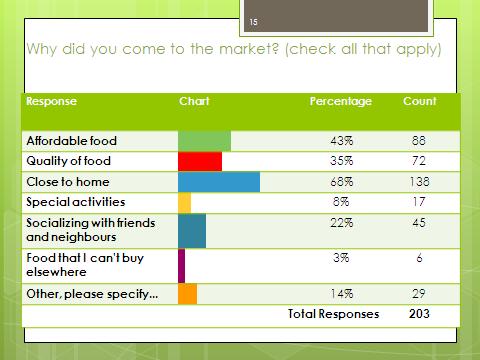
Mobile Food Markets
Continuing with the theme of access to food, the next project for the Poverty and Hunger Working Group is to develop and implement a mobile grocery bus. Mobile grocery buses are refurbished bus or trailers that bring fresh produce and staple goods to neighbourhoods that would not normally have access to these foods. While the Good Food Markets were able to increase access to healthy, affordable and culturally appropriate food in the neighbourhoods they served, we recognize that not all neighbourhoods have the capacity to organize and implement a Good Food Market. Therefore the Poverty and Hunger Working group will now focus on developing new partnerships and collaborating across sectors in order to lay the foundation for a mobile grocery bus to serve residents in the city of Ottawa.
A Mobile Food Market
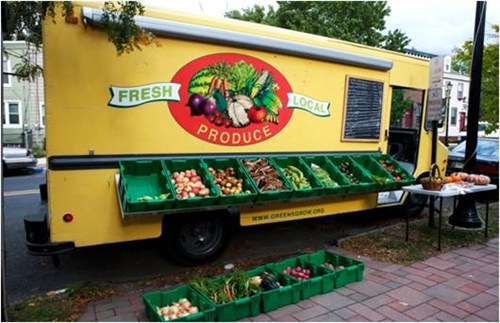
Anti-Poverty Project: 2007-2011
The Coalition’s Network of Community Developers has played an important part in the achievement of these goals through their engagement with community groups and neighbourhoods seeking opportunities to identify and address poverty issues affecting them.
In 2007, the Coalition organized a forum on poverty entitled “Rethinking Poverty”. Its purpose was to ensure a continued commitment from the community to poverty eradication. Based on the recommendations of this forum, the Coalition with the community rededicated itself to advocating for improvements in the areas of income and employment, housing, poverty awareness and community-driven advocacy.
In 2010, the Coalition organized “Rethinking Poverty ll: Immigrant Perspectives”. Based on the outcomes of this forum, the Coalition moved forward to ensure that immigrants and newcomers were engaged in poverty solutions.
In 2011, the Coalition undertook a review of the Anti-Poverty Project through a process of consultation with key stakeholders including organizational partners and anti-poverty groups. Based on the findings of this review, the Coalition approved a focus on better access to nutritious and affordable food for low income people. Early successes include support to a collaborative food buying collective and the creation of Good Food Markets in neighbourhoods affected by poverty. Future activities include the development and implementation of a transportation service to ease barriers for low income people residing in Ottawa’s food ‘deserts’.